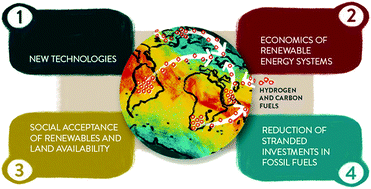A new perspective on global renewable energy systems: why trade in energy carriers matters†
Abstract
Recent global modelling studies suggest a decline of long-distance trade in energy carriers in future global renewable energy systems, compared to today's fossil fuel based system. In contrast, we identify four drivers that facilitate trade of renewable energy carriers. These drivers may lead to trade volumes remaining at current levels or even to an increase during the transition to an energy system with very high shares of renewables. First, new land-efficient technologies for renewable fuel production become increasingly available and technically allow for long-distance trade in renewables. Second, regional differences in social acceptance and land availability for energy infrastructure support the development of renewable fuel import and export streams. Third, the economics of renewable energy systems, i.e. the different production conditions globally and the high costs of fully renewable regional electricity systems, will create opportunities for spatial arbitrage. Fourth, a reduction of stranded investments in the fossil fuel sector is possible by switching from fossil fuels to renewable fuel trade. The impact of these drivers on trade in renewable energy carriers is currently under-investigated by the global energy systems research community. The importance of the topic, in particular as trade can redistribute profits and losses of decarbonization and may hence support finding new partners in climate change mitigation negotiations, warrants further research efforts in this area therefore.



 Please wait while we load your content...
Please wait while we load your content...